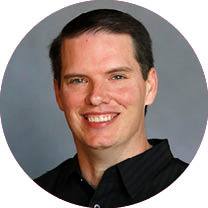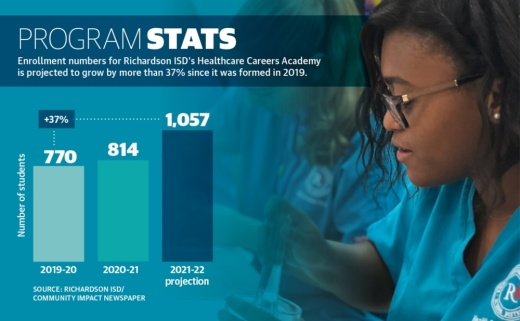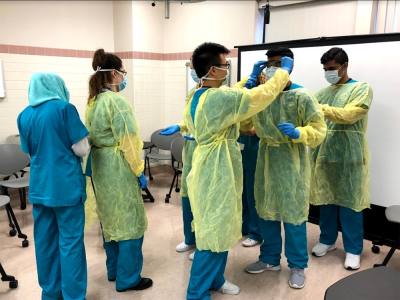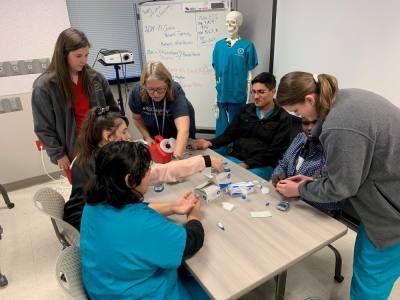After a nurse told him to hold pressure on a patient who was bleeding from the carotid artery, Grossman said he remembers feeling shaky even as everything seemed to be going in slow-motion. He recalled watching the other nurses and doctors in the ICU collaborating to save the patient.
“It got me [to] realize how beautiful the art of saving a life is,” he said. “It was just so eye-opening. It made me realize that I love critical care.”
Grossman is now majoring in nursing at Texas A&M University-Corpus Christi, but he credits his time in RISD’s Career and Technical Education, or CTE, courses at JJ Pearce High School with solidifying his desire to become a health care professional.
The nearly 1,100 students projected to be part of RISD’s Healthcare Careers Academy in the fall will take dual-credit courses from ninth to 12th grade for the chance to earn up to 16 hours of college credit through the district’s partnership with Dallas College, CTE Executive Director Sari S. McCoy said. All students who complete the four-year program receive a Patient Care Technician Level 1 award, she said. They can also earn five other certifications and awards.
“Our desire is to equip students with as many tools and as much knowledge and technical skills that are necessary for them to gain employment right away,” McCoy said. “If they continue on to a two-year college or four-year university—or if they just choose to enter the workforce immediately and remain there for a little while—they are fully prepared.”
Providing a pathway
RISD students can take medical terminology, the Level 1 CTE course, at Parkhill Junior High and Westwood Junior High. Those interested in learning more about medicine and jobs related to the field can then enter the Healthcare Careers Academy at any of the district’s four high schools in ninth grade.
 Students in ninth and 10th grades take core courses and prerequisites at their home campuses, while 11th and 12th graders split their time between being on campus and taking classes at the Methodist Richardson Campus for Continuing Care, which is a specialized hospital that offers limited services. McCoy said they also get hands-on experience at Methodist Richardson, which is a full-service hospital located off the President George Bush Turnpike.
Students in ninth and 10th grades take core courses and prerequisites at their home campuses, while 11th and 12th graders split their time between being on campus and taking classes at the Methodist Richardson Campus for Continuing Care, which is a specialized hospital that offers limited services. McCoy said they also get hands-on experience at Methodist Richardson, which is a full-service hospital located off the President George Bush Turnpike.Having students trained at Methodist Richardson is also beneficial for the hospital, President Ken Hutchenrider said. Some of the students who have gone through the program have been subsequently hired as employees, he added.
“We want to make sure that the students get the absolute best exposure to health care,” Hutchenrider said. “Anything we can do to bring back our homegrown talent, I think that’s so important.”
After high school, local students do not have to travel far to continue their pursuit of a health care education. In addition to the offerings at Dallas College and Collin College, students can also study nursing at The Chicago School of Professional Psychology campus in Richardson. Another option will be West Coast University, which plans to offer a nursing program at its Richardson campus opening in August.
Interest in the nursing program at The Chicago School has risen since being added last year, especially among students from Richardson, according to Associate Dean Tonya Sawyer-McGee.
“[Our Richardson campus] is a great central location for individuals who live in this area,” she said.
Gaining experience
While McCoy said some RISD graduates are able to continue their health care careers as patient technicians right out of high school, there are also many who go to nursing school or enroll in pre-med courses at universities. The district is also speaking with Dallas College about adding pathways for students within the health care academy, McCoy added.
After graduating from Richardson High this spring, Salma Moussaid plans to attend Texas Woman’s University to major in nursing. While she said the hands-on experience she gained from the academy program was initially “terrifying,” it ultimately reinforced her desire to become a pediatric nurse practitioner.
 “The [academy] had a lot of classes to really prepare you,” Moussaid said. “It definitely was worth it and very helpful.”
“The [academy] had a lot of classes to really prepare you,” Moussaid said. “It definitely was worth it and very helpful.”The pursuit of a health care profession is often sparked by an early love of science, according to McDermott Scholar Yilong Peng, who graduated from The University of Texas at Dallas in May.
Sometimes that love evolves, as McDermott Scholar Patrick Nnoromele learned as a high school sophomore in Kentucky when his father was diagnosed with early onset dementia.
“During my college career, I set my sights on pursuing both research and clinical research opportunities,” said Nnoromele, a rising neuroscience senior at UT Dallas. “And I found out that I loved medicine.”
Need for health care workers
The coronavirus pandemic disrupted some of the learning opportunities for students in RISD, but it also deteriorated the pipeline of workers joining the health care field, according to Hutchenrider. Some people decided to move away from direct patient care and nursing after working during the pandemic, he said.
“By being able to expose people to health care [through] programs that we have set up with [local school districts], we think that people will have a much stronger view of what health care is,” Hutchenrider said. “We’ll be able to work through this, but there will be a temporary dip.”
Nnoromele said the realities of the pandemic solidified his desire to help people. As a certified emergency medical technician, he worked as a Dallas Medical Reserve Corps COVID-19 vaccinator at UT Dallas. Nnoromele said he would see people’s faces light up once they got the vaccine.
Sawyer-McGee said the pandemic caused some existing nurses to suffer from burnout or get sick themselves with COVID-19. Texas faces the second worst nursing shortage in the country and ranks 51st nationally in health care access and affordability, according to a June 9 statement from more than a dozen nursing groups in Texas.
“For most of my career, we’ve been in a nursing shortage, unfortunately,” said Sawyer-McGee, who is also a nurse practitioner. “We need schools to really get involved in educating the future nurses that we may have.”
Britt Berrett, who is director of the bachelor’s degree program in health care management at UT Dallas’ Naveen Jindal School of Management, estimated COVID-19 has delayed the pipeline of future health care workers by 15-18 months.
But that gap can be overcome, said Berrett, who has already seen an uptick in nursing students training in hospitals and clinics.
“[The pandemic] has actually elevated the awareness of the importance of caregivers,” he said. “I’m working with students who want to do good. ... I think that this is a catalyst for new entry into the health care space.”







